I really shouldn’t be surprised anymore, but I was nonetheless yesterday.
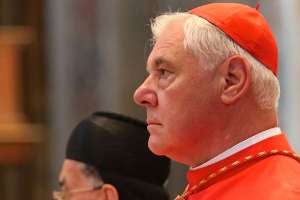 On Friday, Cardinal Gerhard Müller, former prefect of the Congregation for the Doctrine of the Faith and now a sort of free-roaming cardinal with no specific mission, issued a “Manifesto of Faith“. As he explains in the opening paragraphs he did so on the request of various people, both clergy and laity, in order to provide some measure of clarity to the confusion that exists about Catholic doctrine. Without doubt, we must understand this to be based in the different interpretations of recent papal teachings regarding such varied topics like marriage, sexuality and ecumenism. The teachings themselves may not be confusing, but their communication and interpretation most definitely are. But Cardinal Müller’s reasons go beyond this, and back over past decades and the formation, or lack thereof, of the faithful on matters of conscience, the nature of Christ, the Church, the sacraments, morality and eternal life.
On Friday, Cardinal Gerhard Müller, former prefect of the Congregation for the Doctrine of the Faith and now a sort of free-roaming cardinal with no specific mission, issued a “Manifesto of Faith“. As he explains in the opening paragraphs he did so on the request of various people, both clergy and laity, in order to provide some measure of clarity to the confusion that exists about Catholic doctrine. Without doubt, we must understand this to be based in the different interpretations of recent papal teachings regarding such varied topics like marriage, sexuality and ecumenism. The teachings themselves may not be confusing, but their communication and interpretation most definitely are. But Cardinal Müller’s reasons go beyond this, and back over past decades and the formation, or lack thereof, of the faithful on matters of conscience, the nature of Christ, the Church, the sacraments, morality and eternal life.
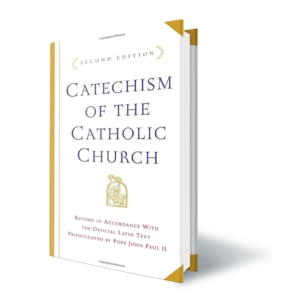 The manifesto is in the first place a summary of the Catechism of the Catholic Church, at least regarding the topics discussed. It is stuffed with references to paragraphs from the document, which aims to summarise the faith, and as such can serve as a helpful reminder of what it is that we confess as Catholics and how that affects our spiritual and daily life. Cardinal Müller also offers a few interpretations and explanations, which are all the interpretations of Tradition, communicated over the years and centuries by popes and theologians alike. Until those interpretations, for example that divorced and civilly remarried faithful can not receive Communion, are changed, they stand. They are what we are beholden to as Catholics. And, despite footnotes and desires expressed in interviews, under Pope Francis no steps have yet been taken to change this.
The manifesto is in the first place a summary of the Catechism of the Catholic Church, at least regarding the topics discussed. It is stuffed with references to paragraphs from the document, which aims to summarise the faith, and as such can serve as a helpful reminder of what it is that we confess as Catholics and how that affects our spiritual and daily life. Cardinal Müller also offers a few interpretations and explanations, which are all the interpretations of Tradition, communicated over the years and centuries by popes and theologians alike. Until those interpretations, for example that divorced and civilly remarried faithful can not receive Communion, are changed, they stand. They are what we are beholden to as Catholics. And, despite footnotes and desires expressed in interviews, under Pope Francis no steps have yet been taken to change this.
On to my surprise.
The reception of Cardinal Müller’s manifesto, especially in social media, has been as expected. Some quietly welcomed it, presenting it as a text worth reading, without, I must say, a lot of further comment. Others, however, including a significant number of Vatican commentators and reporters, have taken the text to frame the cardinal and his supporters:
Cardinal Müller, they say, is opposed to Pope Francis, and with this manifesto he presents an alternative Magisterium. Some have gone so far as calling him an anti-pope. How on earth, I wonder, can a text so rooted in the Catechism, in the faith that we all claim to confess as Catholics, be an alternative Magisterium? It is as if the critics claim that this is not the faith they confess, and, worse, not the faith that the pope confesses. If that were true, we would indeed have an anti-pope, but it would not be Cardinal Müller.
The criticism they level at Cardinal Müller is also marked not by theological refutations, but limit themselves to superficialities. The cardinal is angry at the pope for being dismissed as prefect of the Congregation for the Doctrine of the Faith, they say. We know this because of the way he signed his manifesto. He must be opposed to Pope Francis, because the Holy Father chooses not to discuss doctrine that much, instead focusing on social and charitable issues. Thus, they insist, the manifesto should not be taken seriously, even mocked (and not just the text, but in the first place its author).
Worst of all, those critics continue to insist that there is no confusion. There is therefore no other reason for Cardinal Müller to publish his manifesto than to position himself as an alternative authority to the pope. In reality, though, the different interpretations of various recent papal communications, and the spiritual and formative developments of the faithful over the past decades, are clear as day.
In the minds of Cardinal Müller’s attackers, a cardinal’s duty is to quietly fall in line with what the pope says and does. Their mission is not that of a shepherd, but of a sheep. Any hint at them overstepping that role is seen as an attack against them and what they consider the “fluffiest pope ever”, to borrow a phrase. This is an unhealthy attitude that changes the nature of the Magisterium and the hierarchy of the Church into a dictatorship. Some say that’s due to Pope Francis, but it’s his supposed self-appointed supporters who do the most damage.
The manifesto is text worth reading. As I’ve said above, it offers a reminder of what our faith actually entails in various matters. It says little about practical applications, but theologically it is a reminder of the rich foundation and intricate beauty of our faith. The manifesto is also a call to action, to rediscover that foundation and beauty, and grow beyond the earthly superficialities, which have their place and value, but which do not define our faith and unity with Jesus Christ.
The English text of Cardinal Müller’s manifesto is available in several places, such as here, while my Dutch translation can be found via this link.
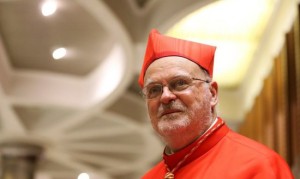 “It surprises me that the topic hasn’t been discussed that much. In Sweden, we have many mixed marriages. But most Catholics aren’t married to practicing Protestants. It is not an issue for us. Of course there are evangelical Christians who would like to receive Communion, but most are non-religious.
“It surprises me that the topic hasn’t been discussed that much. In Sweden, we have many mixed marriages. But most Catholics aren’t married to practicing Protestants. It is not an issue for us. Of course there are evangelical Christians who would like to receive Communion, but most are non-religious.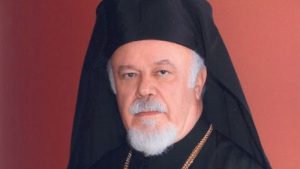 Greek-Orthodox Metropolitan Augoustinos, who hosted Cardinal Woelki in Bonn for the annual plenary meeting of the Greek-Orthodox Church in Germany, expressed himself in similar words after indicating that his church is also following the debate closely. He referred to the Orthodox principle of Oikonomia, which indicates that a regulation can be ignored or a rule broken when it serves the salvation of the person involved. But he then quoted Ecumenical Patriarch Bartholomew I, saying: “As soon as one defines the conditions under which Oikonomia can be applied, Oikonomia itself becomes a rule or regulation.”
Greek-Orthodox Metropolitan Augoustinos, who hosted Cardinal Woelki in Bonn for the annual plenary meeting of the Greek-Orthodox Church in Germany, expressed himself in similar words after indicating that his church is also following the debate closely. He referred to the Orthodox principle of Oikonomia, which indicates that a regulation can be ignored or a rule broken when it serves the salvation of the person involved. But he then quoted Ecumenical Patriarch Bartholomew I, saying: “As soon as one defines the conditions under which Oikonomia can be applied, Oikonomia itself becomes a rule or regulation.”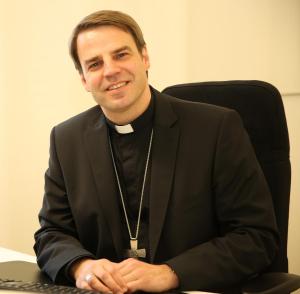 “It is right that we do not turn anyone away from the Communion bench. At that moment no judgement can be made about the discernment of conscience of the individual receiving. I can’t ‘expose’ anyone then. But when we take our understanding of the Eucharist seriously, there can be no superficial practice of giving Communion to just anyone. Therefore, as the priest giving Communion, I am obliged to offer people, at a suitable occasion, personal and spiritual guidance – and explain our understanding of the Eucharist more deeply. And yes, the praxis of individual pastoral care can indeed lead to singular and temporary situations. But in my opinion an official regulation of such exceptions can make it even more likely for such exceptions to become the rule. The current debate already shows that. It is basically less about the “serious spiritual need of individuals,” and more about the interdenominational marriages in general.”
“It is right that we do not turn anyone away from the Communion bench. At that moment no judgement can be made about the discernment of conscience of the individual receiving. I can’t ‘expose’ anyone then. But when we take our understanding of the Eucharist seriously, there can be no superficial practice of giving Communion to just anyone. Therefore, as the priest giving Communion, I am obliged to offer people, at a suitable occasion, personal and spiritual guidance – and explain our understanding of the Eucharist more deeply. And yes, the praxis of individual pastoral care can indeed lead to singular and temporary situations. But in my opinion an official regulation of such exceptions can make it even more likely for such exceptions to become the rule. The current debate already shows that. It is basically less about the “serious spiritual need of individuals,” and more about the interdenominational marriages in general.” Words from Pope Francis, in
Words from Pope Francis, in  This quote is especially interesting as
This quote is especially interesting as 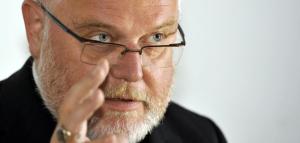 Cardinal Reinhard Marx, president of the German Bishops’ Conference and one of the supporters of the pastoral outreach,
Cardinal Reinhard Marx, president of the German Bishops’ Conference and one of the supporters of the pastoral outreach, 
 Bishop Jan Hendriks, auxiliary bishop of Haarlem-Amsterdam, studies the matter in
Bishop Jan Hendriks, auxiliary bishop of Haarlem-Amsterdam, studies the matter in  The most extensive comment, although one without directly addressing the cardinal, comes from Bishop Gerard de Korte of ‘s-Hertogenbosch. In his
The most extensive comment, although one without directly addressing the cardinal, comes from Bishop Gerard de Korte of ‘s-Hertogenbosch. In his 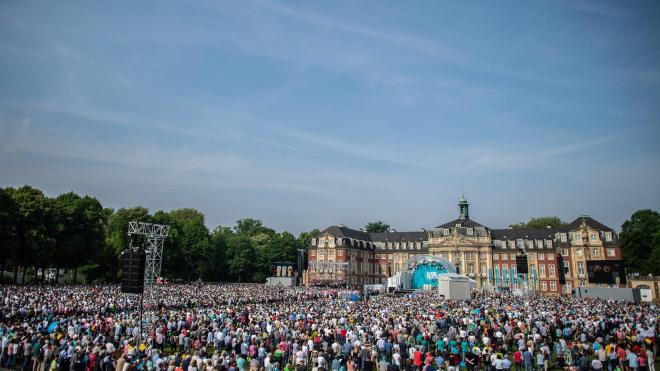
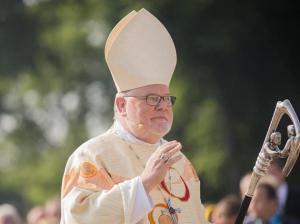 In his homily at the closing Mass of the four-day event, Cardinal Marx reiterated that the Catholic Church must make its unity clear, and that includes its bishops.
In his homily at the closing Mass of the four-day event, Cardinal Marx reiterated that the Catholic Church must make its unity clear, and that includes its bishops.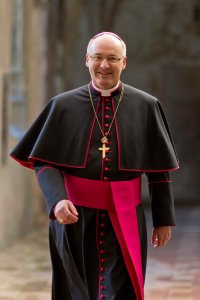
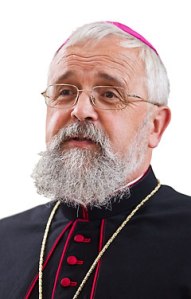 Opposing the actions of the seven bishops is Bishop Gerhard Feige, bishop of Magdeburg and president of the ecumenism commission of the German Bishops’ Conference. In a contribution to Der Zeit last Thursday, Msgr. Feige stated that not taking the chance to help people deepen the joy of the faith and their participation in the Eucharist, as well as promoting ecumenical encounters and strengthening the marriage bond would be “macabre and shameful”. Contrary to other bishops, Msgr. Feige insists that the pastoral outreach exists within modern theological and legal possibilities, referring to the canon law paragraphs which allow local bishops to decide under which circumstances non-Catholic can receive Communion. These circumstances, however, are emergency situations in which the danger of death and the unavailability of ministers of a person’s own denomination play key roles.
Opposing the actions of the seven bishops is Bishop Gerhard Feige, bishop of Magdeburg and president of the ecumenism commission of the German Bishops’ Conference. In a contribution to Der Zeit last Thursday, Msgr. Feige stated that not taking the chance to help people deepen the joy of the faith and their participation in the Eucharist, as well as promoting ecumenical encounters and strengthening the marriage bond would be “macabre and shameful”. Contrary to other bishops, Msgr. Feige insists that the pastoral outreach exists within modern theological and legal possibilities, referring to the canon law paragraphs which allow local bishops to decide under which circumstances non-Catholic can receive Communion. These circumstances, however, are emergency situations in which the danger of death and the unavailability of ministers of a person’s own denomination play key roles.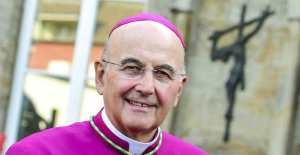 Münster’s Bishop Felix Genn is hopeful of finding a consensus. While the way in which the seven bishops expressed their difficulties with the conference’s vote did not make him happy, he understands their questions of conscience. In an interview for WDR radio Bishop Genn expressed his happiness about the way in which the standing council of the bishops’ conference discussed the issue last week. And although he would have preferred that the seven bishops had first informed the others about their letter before sending it, Bishop Genn’s attitude is perhaps the most consensus-minded in the delegation, which may be a reason for his inclusion. The bishop, for his part, simply thought of his mother’s motto when hearing about being included in the delegation: “One has never got enough work to do.”
Münster’s Bishop Felix Genn is hopeful of finding a consensus. While the way in which the seven bishops expressed their difficulties with the conference’s vote did not make him happy, he understands their questions of conscience. In an interview for WDR radio Bishop Genn expressed his happiness about the way in which the standing council of the bishops’ conference discussed the issue last week. And although he would have preferred that the seven bishops had first informed the others about their letter before sending it, Bishop Genn’s attitude is perhaps the most consensus-minded in the delegation, which may be a reason for his inclusion. The bishop, for his part, simply thought of his mother’s motto when hearing about being included in the delegation: “One has never got enough work to do.”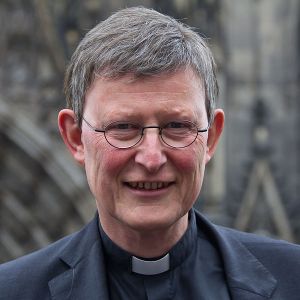 While the letter by Cardinal Woelki, Archbishop Schick and Bishops Zdarsa, Hanke, Ipolt, Voderholzer and Oster received much attention in the media, the signatories themselves treated it as a normal matter of correspondence. Cardinal Woelki, who was visiting Ukraine when the news broke, expressed his surprise at the hype and the talk about dissent. Presenting the questions about intercommunion to Rome was not so much a matter of going against his fellow bishops, but rather came from the importance of the matter: “With several bishops, we were convinced that it would be good to universally coordinate the solution that we have discussed and established here, with an eye on the unity of the Church and the common ground with the other particular churches.” Cardinal Woelki is not so much opposed to the proposals from the conference, to allow non-Catholic spouses of Catholics to receive Communion with their partner on a case-by-case basis, but does not think it is a decision that should be made by the German bishops alone.
While the letter by Cardinal Woelki, Archbishop Schick and Bishops Zdarsa, Hanke, Ipolt, Voderholzer and Oster received much attention in the media, the signatories themselves treated it as a normal matter of correspondence. Cardinal Woelki, who was visiting Ukraine when the news broke, expressed his surprise at the hype and the talk about dissent. Presenting the questions about intercommunion to Rome was not so much a matter of going against his fellow bishops, but rather came from the importance of the matter: “With several bishops, we were convinced that it would be good to universally coordinate the solution that we have discussed and established here, with an eye on the unity of the Church and the common ground with the other particular churches.” Cardinal Woelki is not so much opposed to the proposals from the conference, to allow non-Catholic spouses of Catholics to receive Communion with their partner on a case-by-case basis, but does not think it is a decision that should be made by the German bishops alone.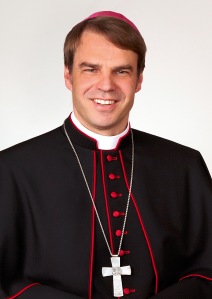 The most extensive explanation for signing the letter comes from Bishop Stefan Oster of Passau. In an article published in the diocesan magazine and
The most extensive explanation for signing the letter comes from Bishop Stefan Oster of Passau. In an article published in the diocesan magazine and 